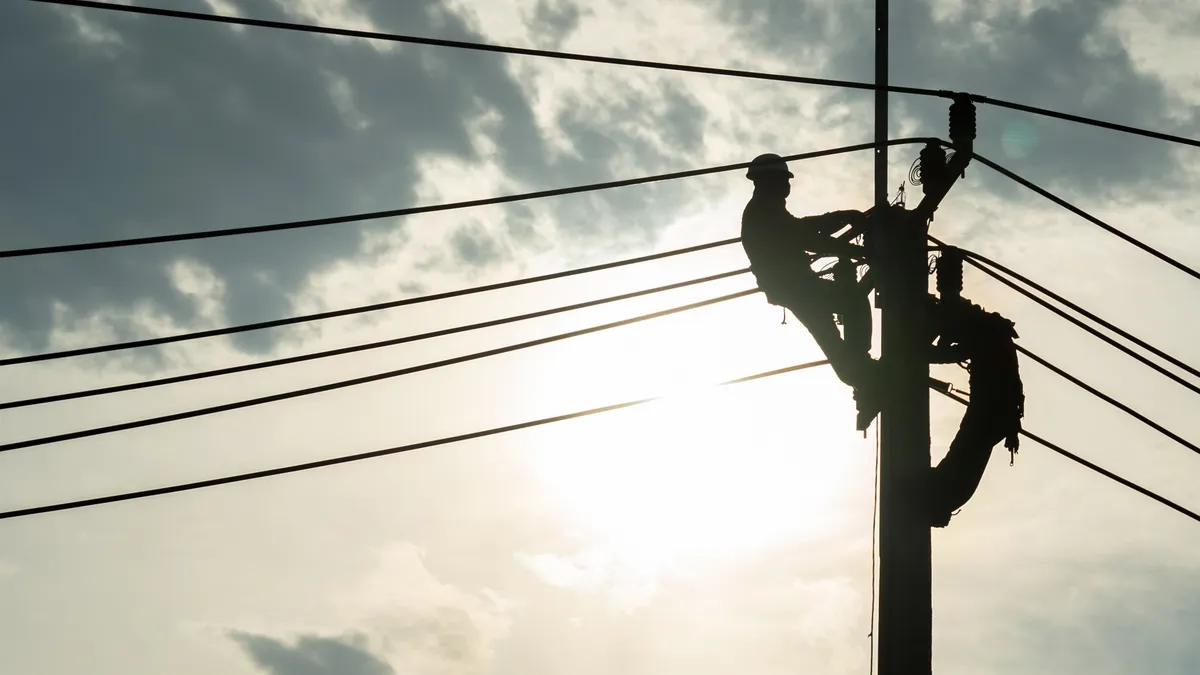Dive Brief:
- Connecticut regulators on Wednesday adopted a performance-based regulation framework for electric distribution companies, expected to be phased in next year.
- The Public Utilities Regulatory Authority voted 3-0 to establish the regulatory system called for in state legislation following Tropical Storm Isaias in August 2020 that left more than 1 million customers of Eversource Energy and Avangrid subsidiary United Illuminating without power for days.
- A spokeswoman said Eversource supports a “strong and fair regulatory environment,” but cited concerns by an industry analyst that Connecticut’s regulatory environment is a drag on investment.
Dive Insight:
The framework is a first step, with a second stage launching next year that will include decisions and orders to put in place regulatory changes in rate cases or other relevant proceedings. Phase 2 will consider mechanisms for revenue adjustment and performance and integrated distribution system planning.
Regulatory goals include “excellent operational performance,” “customer empowerment and satisfaction” and “reasonable, equitable and affordable rates.” Outcomes would include reduced greenhouse gas emissions, more reliable and resilient electric service and other priorities.
“It’s definitely a re-set of the regulatory framework in terms of recognizing that we should be evaluating the utilities on their performance and moving toward a more customer-centric approach to regulation in general,” PURA Chairman Marissa Gillett said as she and her two colleagues approved the measure.
Performance-based rules move the regulatory model away from cost-of-service that considers a utility’s revenue requirements and rates of return.
“Cost of service regulation really revolves around a utility’s perspective on what it means to provide service to its captive customers,” she said at a news conference. “There is little to no consideration of what outcomes or value a customer is deriving from that service and rather the focus is on compensating the utilities for its investments.”
Performance-based regulation is a “stark departure from that mindset,” Gillett said. Instead, it’s premised on compensating a utility based on progress toward identified goals, outcomes and considerations.
Connecticut is the second state to adopt performance-based regulations, she said. Hawaiian regulators, who have adopted performance-based regulation, worked with PURA staff on developing Connecticut’s framework, PURA said.
Gov. Ned Lamont, D, who appeared with Gillett and Democratic and Republican state lawmakers in a bipartisan show of support for PURA’s decision, said the new regulations will distinguish between how well or poorly a utility does its job.
“You just don't get paid an automatic 9% whether you do good work or bad work,” he said. “You get paid for doing good work.”
Spokesperson Craig Gilvarg said United Illuminating welcomes the regulation “and looks forward to aligning its operations, investments, customer service engagement and system planning within this new, constructive regulatory framework.”
Eversource spokesperson Caroline Pretyman said the utility looks for regulations that balance “safe and reliable service . . . with the need to support sufficient investment in the system.”
“The investor community has spoken loud and clear in recent months warning that the regulatory environment created by PURA in Connecticut is imbalanced, harming the interests of customers given the need for sustained, long-term investment in utility infrastructure,” she said.
In a March 21 note to clients, Shahriar Pourreza, senior managing director at Guggenheim Partners, asked, “What do we think is dragging on shares?”
“In our view, the crux of investor hesitancy on Eversource hinges on two key areas: 1) Connecticut and 2) the wind sale process,” he said, referring to the utility’s announcement it’s looking to sell its share of offshore wind operations.
“Connecticut remains the single largest overhang for longer-dated investors” with a regulatory environment that Pourreza said “remains volatile.”
Aquarion Water, a subsidiary of Eversource, is appealing in Connecticut Superior Court a decision last month by PURA that rejected a requested rate increase and instead reduced rates.
“In our view a confrontational environment in the state, or at least one in which utilities must grind through pancaked, fully-litigated cases could potentially lead to slight bill relief via lower ROEs and higher capital/expense disallowances, but at a cost” of economic activity, grid modernization and spending on decarbonizing, Pourreza said.
Gillett, asked if PURA is making it harder for Eversource to borrow in bond markets, said she is “fully rejecting that argument.”
Eversource, with access to “multibillion dollars of working capital,” argues that the “sky is falling,” she said.
“Frankly, it’s not my concern what their shareholders make,” Gillett said. “It’s my concern what the cost of debt is and how that factors into rates.”
Analysts have before cautioned investors about Eversource and its strained relationship with PURA . Eversource and United Illuminating were each fined by PURA over their responses to Isaias, but Eversource was hit with a larger penalty and stronger criticism.
Moody’s Investors Service in June 2021 said Connecticut’s regulatory environment is “more challenging and less supportive” of the credit quality of Eversource’s Connecticut Light & Power.
State legislation now advancing would further tighten utility regulations. It proposes to prohibit rate recovery for costs for contested PURA proceedings, dues for business or trade associations, lobbying, and advertising; limits executive compensation; and seeks other consumer protections.
Michael Doyle, senior equity analyst for utilities at Edward Jones, said the state’s consumer-friendly reputation may come at the expense of utilities.
“It’s probably widely believed that Connecticut is one of the most difficult states to operate a utility,” he said in an interview.














